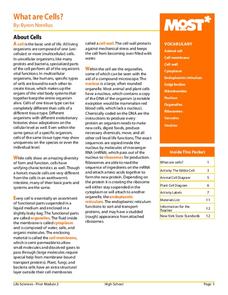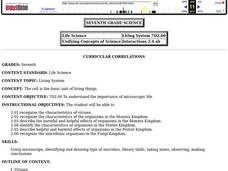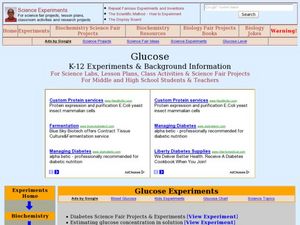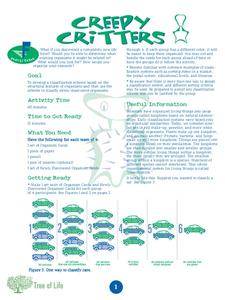Curated OER
What Are Cells?
Energize the cells of young biologists with an edible life science activity. Engaging learners in exploring the inner workings of plant and animal cells, this activity involves using colored jello and various sweet and tasty treats to...
Biology Junction
Cellular Division
Based on current scientific knowledge, all cells come from preexisting cells. Scholars learn about cell division, cell replication, mitosis, meiosis, and more with a PowerPoint. It describes the differences between prokaryotes and...
Biology Junction
Energy Flow in an Ecosystem
Every living thing requires a food source, thus the interconnections in ecosystems become complex. Scholars learn about these interconnections in a presentation on energy flow. It starts with the sun and moves through many different...
National Nanotechnology Infrastructure Network
Biology Reference Sheet
First year life science or biology pupils will appreciate this all-inclusive reference page. It provides a diagram of both a plant and an animal cell, the metric system prefixes, classification levels, definitions for cell processes, the...
Cornell University
Classification
Explore the scientific method of classification. An interactive activity asks learners to create a classification system for a group of objects and develop a flow chart to communicate their systems. In addition, individuals use a...
Curated OER
Cells
Seventh graders look up pictures of viruses or pictures of models of viruses. Using pipe cleaners, beads, Styrofoam or other available materials make models of these shapes. They then observe a demonstration to show the effect of Tobacco...
Curated OER
The Origin of Life
In this origin of life worksheet, students write answers to five questions. They describe characteristics of the first life forms and how scientists believe oxygen accumulated in the Earth's atmosphere.
Curated OER
What is Gene Expression?
Bright slides with clear diagrams will provide students with a useful, concise summary about gene coding for specific proteins and their regulation.
Curated OER
Glucose
High schoolers conduct various experiments on glucose. For this biology lesson, students differentiate the process of diffusion and osmosis. They test different foods for the presence of glucose and starch.
Curated OER
Energy in a Cell
In this cell energy learning exercise, learners are given clues about the light capturing process in plants and the energy producing reactions in animals to complete a crossword puzzle.
Curated OER
Body Battles!
Seventh graders explain the role of white blood cells in fighting infections. In this life science lesson, 7th graders create flow charts showing the immune response process. They act out and play a game to simulate actions of the immune...
Curated OER
The Six Kingdoms
In this classification worksheet, learners complete a chart listing the characteristics of each of six kingdoms. They write definitions for three terms.
Curated OER
Algal Blooms
For this algal blooms worksheet, students order the stages of a red tide. They answer two short answer questions. Students define three terms relating to algal blooms.
Curated OER
Eukaryotic Cell Structure
In this cell structure learning exercise, students review the structure and function of eukaryotic cells. Students also compare and contrast an animal cell with a plant cell. This learning exercise has 15 fill in the blank, 8 true or...
Curated OER
Creepy Critters
Students develop a classification scheme based on the structural features of organisms. In this organism lesson students divide into teams and complete a fun activity.
Curated OER
Creepy Critters
Students classify imaginary newly discovered organisms. For this classification lesson, students are given cards showing imaginary organisms that have been recently discovered. They must classify the organisms based on their...
Curated OER
Zoology Word Search Puzzle
In this science worksheet, students look for the words that are related to the concept of zoology that is reviewed in the sheet. They also acquire new vocabulary.
Curated OER
Diversity/ Organisms Word Search Puzzle
In this literacy worksheet, students practice looking for the words that are related to the idea that is focused upon in the sheet. The skill of spelling is used and vocabulary increases.
Michigan State University
Michigan State University: Digital Learning Center for Microbial Ecology: Microbe Zoo
Explore the "many worlds of hidden microbes" in different areas of the Microbe Zoo: DirtLand, Animal Pavilion, Snack Bar, Space Adventure, and WaterWorld. A fun and informative resource that sheds light on the role of microbes in our...
University of California
Ucmp: Introduction to Slime Molds
This University of California Berkeley site offers a definition of slime molds, structure, and life cycle.
Other
Microbe World: Experiments
In this hands on site, students will have the opportunity to be amateur microbiologists by performing a number of experiments. Supplies needed can found in the home or at a nearby store.
Tree of Life Project
The Tree of Life Web Project
The Tree of Life is a multi-authored, Internet distributed project containing information about phylogeny and biodiversity. The Tree of Life can be used to locate information about a particular group of organisms through their taxonomy.
Open Curriculum
Open Curriculum: New Kingdoms
Between 1866 and 1977, a total of four new kingdoms were added to the original plant and animal kingdoms identified by Linnaeus. The new kingdoms include Protista (protists), Fungi, Monera (eubacteria), and Archaea (archaebacteria)....
BioEd Online
Bio Ed Online: The Science of Microbes: The Variety and Roles of Microbes
Students learn about the four major groups of microbes and their characteristics, and the roles microbes have in the world. The instructional activity and PowerPoint slides can be downloaded. The included instructional video on the four...























